| Article ID | Journal | Published Year | Pages | File Type |
|---|---|---|---|---|
| 5099719 | Journal of Economic Dynamics and Control | 2015 | 35 Pages |
Abstract
Optimal bank regulation is studied in a model where bank quality is private information and bank portfolio choice is subject to moral hazard. Regulators wish to control bank risk solely because high risk adversely affects a bank incentives to improve its mean return. Numerical methods are developed to study the model. Capital regulation alone has a limited ability to separate types. Including ex post fines achieve separation at lower cost, resulting in improved welfare. Low-quality banks are fined on high returns in order to control risk-taking. High-quality banks face fines on lower returns mainly to ensure truth-telling by low-quality banks. High-quality banks bear the full cost of regulation.
Related Topics
Physical Sciences and Engineering
Mathematics
Control and Optimization
Authors
David A. Marshall, Edward Simpson Prescott,
